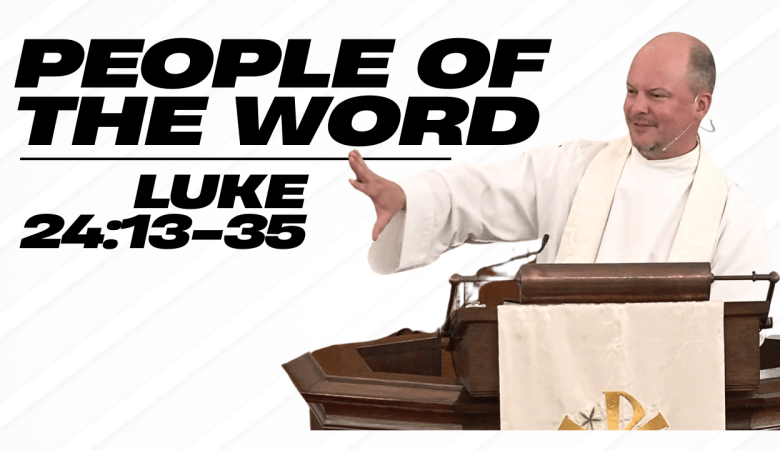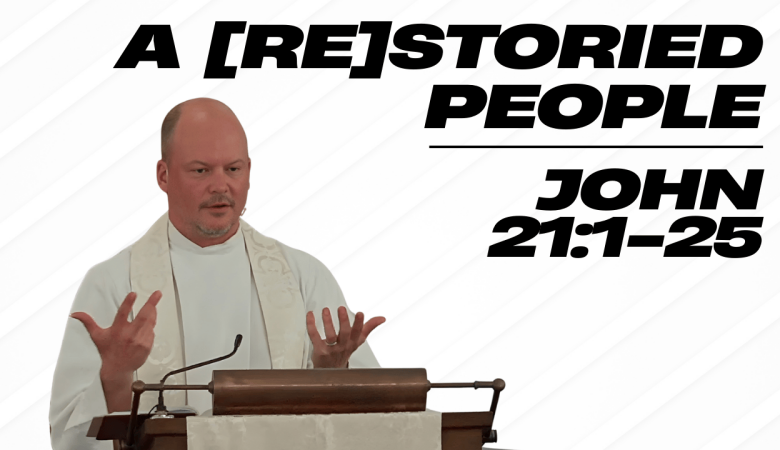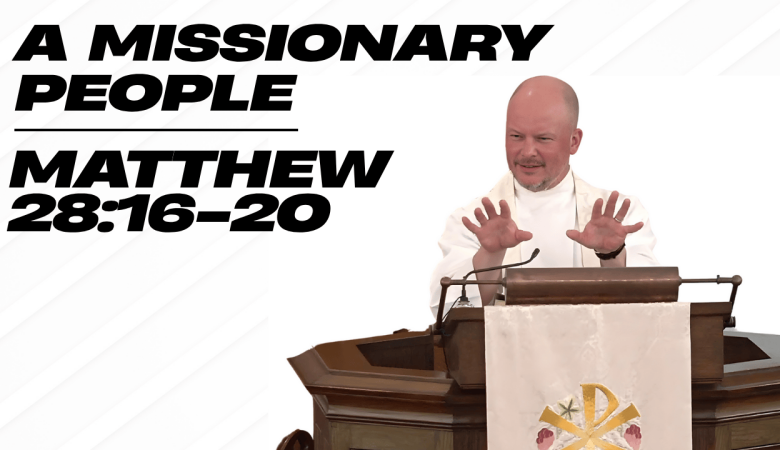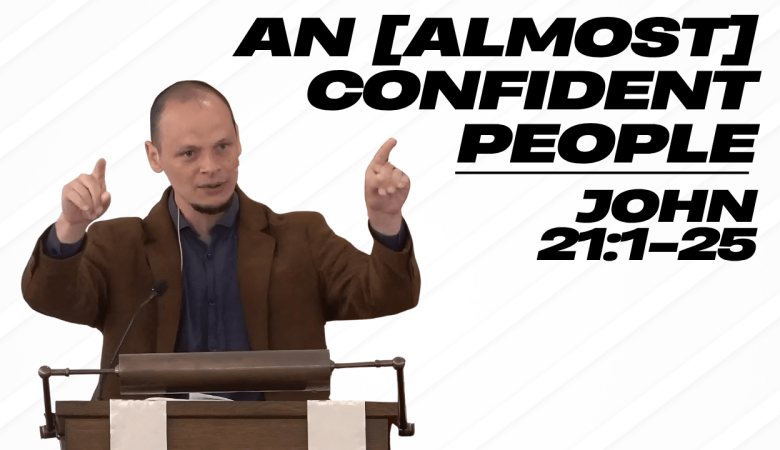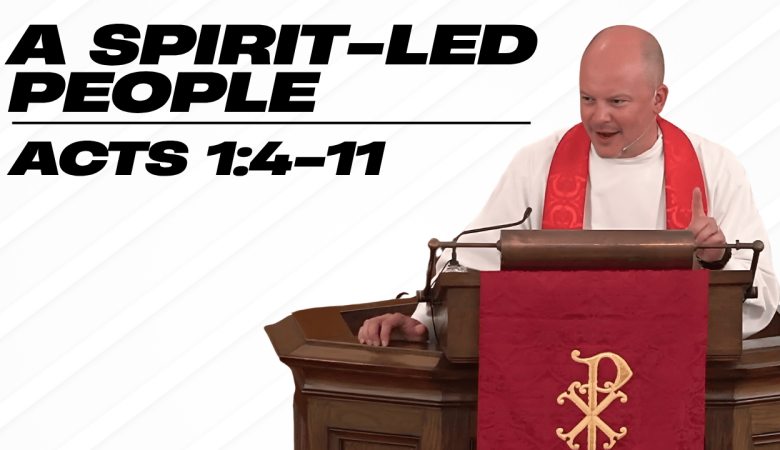Series: Resurrection Narratives
A Believing People
May 04, 2025 | Peter Rowan
Passage: John 20:19-31
Summary
The narratives of Jesus with his disciples after the resurrection inform us about what it means to be a resurrection people. Jesus meets them in their fears and in their unbelief and he speaks peace over them and shows them his scars as a call to believing in the power of his resurrection. His scars and his words are the very things they need and they are the very things we need if we are to be a people that bear witness to his work in our own lives and world that are so full of anxiety and fear.
Transcript
Lord, we thank you for your word this morning. We thank you for this beautiful account of how you met your disciples there in that locked up room full of fear and unbelief. And I pray that you'd meet us in our fear and in our unbelief and draw us more and more into the great story of your redemption of the world and the death and the resurrection of Jesus, in whose name we pray. Amen. All right, so I'm just going to make this comment that I occasionally make at the beginning of sermons and I'm not going to say everything there is to say about this passage.
Okay? There is a lot here and there's a lot of wonderful things that could be said. You may have heard that religion again is on the rise. I wonder if you've heard this. It's true.
There have been a number of studies, actually a good number of studies and fairly rigorous studies that have shown that the decline of religion has sort of reversed. It's sort of over, if you will. For the most part, over the last 25, 30 years, year after year, religious adherence, faith has been in the decline. In fact, probably some of you heard this, but in the year 2021, the membership in churches in the United States for the first time in recorded history dropped below 50%. Okay, so it had been sort of steadily going down.
And yet these studies have shown that this has changed over these last four or five years. And it has not just stayed sort of steady, held steady, but it's actually been on increase. Two weeks ago, maybe you saw this article in the Guardian, that British newspaper, it was quoting a British study that was just done and it actually showed this, that over the past six years church attendance in England and Wales was up 50%. Guess what? The age group that made the largest jump.
Anybody? What was that? College. College age. 18 to 24 year olds made the largest increase in that regular religious adherence going to church.
And then actually it was 65 and up. They made the next jump up. But a huge percentage of people that are more interested in churches in the uk it seems as though religion and belief seem to be on the rise. Now here's another thing. If you've kind of been abreast of these conversations, what you probably also heard is in some ways it was never entirely in the decline.
In fact, what we have done is we've sort of moved our beliefs and our religious practices and those things which we adhere to. So quite a number of people, maybe you've read this, have said that what we have done is instead of getting what we've done is we've shifted our devotion to God and to religious practice and our hope in God to political figures, political practice, the sacrament of voting. We wear our badges proudly. Don't I vote? Pascal famously wrote, there is a God shaped vacuum in the heart of every person.
Children, that is not referring to a. Like a vacuum that you clean with. It just means an empty space, okay, that there's a. There's an empty space that God alone fills. But the truth is, and this is what's being argued is that we try to fill it with all kinds of other things in all kinds of other ways.
Maybe you saw this or maybe you read this article by Lauren Jackson. She used to be a Mormon and doesn't adhere to any religious practice. Now, she wrote an op ed piece in the New York Times a couple weeks ago. The title was Americans haven't Found a Satisfying Alternative to Religion. That's what she wrote.
She said that she spent her 20s, quote, worshiping at the altar of work. And we all know that that's an alternative to religion. Place where you find your meaning and your hope. Place your dreams there. But she shares with us how she gave up her religious ardor and her desires over to her workout practices, her practicing mindfulness therapy sessions, saunas, mindfulness apps.
Here's what she writes specifically. But even as people left religion, mysticism persisted. More people have begun identifying as spiritual but not religious. In 2015, researchers at Harvard began studying where those Americans. Sorry.
Where these Americans were turning to express their spirituality. Research reporters did too. The answer included yoga, CrossFit. Now, I know we don't have a lot of CrossFitters here. I'm telling you, I have quite a few friends that are CrossFit people.
And it fits Soul Cycle. It's a type of cycling. I love the name. Even Soul Cycle, supper clubs and meditation, she says. Oprah tried sound baths.
Gwyneth Paltrow advertised energy healing. More than a third of American women under 30 have downloaded the personal astrology app costar, according to the company. Now she quotes from Ethan Shagan, a historian of religion at UC Berkeley. Secularization in the west was not about the segregation of belief from the world, but the promiscuous opening of belief to the world. We have a God shaped vacuum.
So during this Easter season, we're looking at some of the accounts of Jesus and his disciples post resurrection. And in these accounts we're asking, what does it mean for us? What kind of people are we to be? How does Jesus interact with us as a Church, last week I suggested to you that from that story of Jesus and the two disciples on the road to Emmaus, we're to be people that actually receive the questioning word of God, allow God to ask his questions to us. We're to be people that are to receive the given word of God, the Holy Scriptures as they've been given out, inspired by, breathed out by the Holy Spirit.
And we're to be those who receive the suffering word of God, actually Jesus in the flesh, suffering for us, his body broken for us, and his blood shed for us. But this morning we have one of the other great stories of the resurrected Christ and his disciples. And this story is often referred to by one man's name. Who's that? Thomas and his nickname, which we give nickname, Doubting Thomas.
Right. And that's kind of interesting and a little bit odd because what is overwhelmingly true of this story is that what Jesus is inviting us into and what John desires for us to be as a people of belief, he actually says at the end of the story, these things are written down so that you may believe. And belief actually this word pisteo, which is the same word that we often translate in the New Testament faith. That word that was mentioned three times in the Romans chapter one passage, pisteo here is mentioned some seven times. In some ways, the emphasis of this story is the idea of belief.
So we're going to look at this passage again. I said we're not going to look at everything that we could in this passage, but I want us to look at it through the idea of a believing community. Okay? A believing community. And first I want you to see where Jesus meets his disciples.
Okay? And the first place that Jesus meets his disciples is in a place of fear. So open up your Bibles with me. If you don't have one, you can grab that one in front of you in the pew. And if you don't have a Bible, please take that Bible home.
Or if you know somebody who's just interested in maybe reading the Bible, grab one of those, bring them for them. You can take them and have them and give them to your friends. Okay? So if you look with me down there, verse 19, where our passage began, chapter 20 of John. On the evening of that day, the first day of the week, the doors being locked, where the disciples were for fear of the Jews, Jesus came and stood among them.
So the first thing we learn about is that Jesus comes to these disciples who are so fearful that they've locked the door. And I want to suggest to you, first that this is a very understandable place for them, the disciples living in fear. Okay, there's lots of reasons for fear here. It says that they were fearful of the Jews, but that's to say that they were fearful of what could possibly happen to them or maybe what could be said of them or how they might get caught or how they might actually, at this point, they haven't seen Jesus. Two of them, Peter and John, to the place where his body had been laid, but they'd been told about him and they've heard these rumors.
But maybe they're thinking, you know, what, what if they think that we took the body? There's all kinds of legitimate reasons for these disciples to be full of fear. They're gathered together, they're huddled together. Maybe they're talking over the news of what had happened, how they'd seen Jesus die and how they had heard of this news, but there's no way it could have happened. But what could possibly happen to them now if they were found out?
Maybe they would be blamed for taking the missing body. The point is that they are living in fear. And in a way that their disbelief in what God has done and what he said he would do is manifesting itself now in fear in them. And let's just admit for a moment that this is actually a state that we often find ourselves in and that we are overcome by and that we actually want to lock down doors to protect ourselves. Right?
Because we often actually live in fear. We hear Jesus tell us in Matthew chapter six, right in the middle of the Sermon on the Mount, that we're not to worry about tomorrow because tomorrow has enough worries of its own. And I hear that, and I'm like, wait, that's exactly why I'm worrying. Because it has enough worries of its own. You know, we have all kinds of reasons we can think of to simply lock the door and live in fear.
And we've heard about the risen Christ. But then we've also heard about people being canceled and smear campaigns and bankruptcy and being shunned by one's friends and adult children not speaking to you anymore. And all innumerable things, things that we go that is fear inducing. Lock the door. We have friends that have lost jobs and taken 18 months to find their next job, friends that have lost homes, lost spouses.
If there's one thing that is sort of understandable and that we are unbelievably good at, it is fear. You all have heard the stats about anxiety, how it's unbelievably risen recently, largely with the rise of secularism. But anxiety is just blowing up all over the place, and we know the reasons for it. So my point with you and for us today is that Jesus meets these disciples in this place of fear, okay? The second place that he meets them is actually in this place of unbelief, or at least he specifically meets one of his disciples.
Now, we actually were told that this is a week later. It says eight days later. Most Bible scholars actually think that this is emphasizing a week later because they were gathering together. And John mentions this actually again later on in Revelation. He was taken up on the Lord's Day.
John has a strong theology of Sunday being the day of the resurrection and the people time when people gather together. But anyway, they gather together. And again we learn that the door was locked. It might be in the same room. And I said, you know, what's Thomas's nickname?
But it's doubting. But actually our passage tells us that he has another nickname. What is that other nickname? Anyone?
The twin is a Didymus. I mean, John's like, hey, it's not that big of a deal. He's just Thomas the twin. And we're like, no, we're going to give him the doubting name, okay? Anyway, I feel like we should reinstill the true nickname of Thomas.
He's just Didymus the twin. Sort of mundane. Come on. But rather than doubting Thomas or rather than the twin Thomas, at the very least, what we could say is that he's the unbelieving. Comments didn't lead any comments.
So Thomas wasn't with the others when Jesus appeared to them in the locked room. They tell him about it, about seeing the Lord. And he says, unless this is verse, verse 25, unless I see in his hands the mark of the nails and place my finger into the mark of the nails and place my hand into his side, I will never believe. He says, I will never. And actually, in the Greek, it's two words.
It's U, me, which is like, not, no, I'm never going to believe this. And then when Jesus actually meets him in verse 27, what is he? What does he say at the end there? But do not disbelieve, which is aposteo, which is just a little prefix for not, not believe. Do not, you know, don't be the one who not believes, but believe.
So what I'm suggesting to you, though, is that Jesus meets these disciples, and specifically this disciple in his unbelief, first their fear, and second, in their unbelief. So part of Lauren Jackson's article in the New York Times is about her tracing the rise of unbelief. You can take think of the new atheist movement from years back, but she says this. She says American secularization was an immense social transformation over this rise of secularization. So there's this immense, immense transformation.
She goes on to say this. Has it left us any better off? Are we better off for giving up on belief? She says people are more unhappy than they've ever been and the country is in an epidemic of loneliness. It's not just secularism that's to blame, but those without religious affiliation in particular rank lower on key metrics of well being.
I've shared some of these things with you in the past. They feel less connected to others, less spiritually at peace, and they experience less awe and gratitude regularly.
We know that there are probably many factors at play with the rise of anxiety and loneliness and these kinds of things. Okay, there's no question about that. But what she's saying at the very least is that we see a. See the rise of secularization, the rise of giving up on belief in God, unbelief, disbelief, and the rise of anxiety and loneliness. They seem to have gone together on the same trajectory.
And what we see here is that Jesus is meeting his disciples in their fear and he's calling Thomas out from his lonely unbelief into the belief of what God has done in Christ. Now this is the end of the Gospel of John. The beginning of the Gospel of John says this. In the beginning was the Word, and the Word was with God, and the Word was God. And interestingly, throughout that whole gospel, nobody actually says to Jesus, you're God.
John tells us that. In fact, John tells us that in quite a number of ways. Some of you know that seven times in the gospel, Jesus says, I am. You know, the way, the truth and the life, the good shepherd and the bread of life, and these kinds of things. He's claiming the identity of the God who saved his people out from Egypt, that met with Moses there in Exodus 3 and said, I am.
But when we look at the Old Testament, often what we find is people living in these two things. Fear and unbelief. The idea of scarcity, will I have enough? Will the future be okay? And unbelief in the idea that God is actually going to care for us.
I mean, think just at the very beginning, the very first sin in some ways were these two things. They had all, all the trees and the plants to eat, but they saw still Scarcity. And they said we need to take it all. Are we going to be okay if we don't have it all right? And they don't believe the words of God that are good for them.
Or if we continue on, think of the Israelites wandering in the wilderness. God has just literally saved them out from slavery in Egypt and they've just sung the song of their redemption being brought through the Red Sea. Exodus. What happens in Exodus chapter 16? Hamburgers back in Egypt.
Let's go back. You're like, what? Fear and unbelief. Can God actually do what he promised to do? Can he bring us through this great desert?
What happens when they finally are brought through the desert, brought to the promised land and the 12 spies go into the land, 10 of them come back and they go, this is too scary. God cannot do it. Fear and unbelief. It's just, it is the pattern of how the story of scripture is told with regards to God. We often engage with him in this idea of fear and unbelief.
Think with me. Just a few weeks ago we looked in Mark about the story of Jesus with his disciples in the boat, in the storm, in the Sea of Galilee and they are all fearful. They're rousing him from his sleep. And what does he say? You know, but you have little faith, you have little belief.
This pattern of fear and unbelief. And we can trace these two traits again and again throughout the Bible and among God's people. And what we see when these two traits are actually together is actually, actually an increase in the same things that we live in now, right? Anxiety and things going awry and just not going well. Loneliness, increasing, anxiety, going through the roof, reaching after other gods.
Let's make a golden calf to fill the God shaped vacuum in their hearts.
And yet here's part of my point for us this morning. This is actually a big point. Jesus goes to them in that place, right? He's not going, oh, you full of fear people. Thomas, unbeliever.
He doesn't treat them like that. So the two other things I want you to see actually is how Jesus does treat them. What does he do? Two things he does. He does a couple others.
But these two things I think stand out to us. And the first thing is something that he says to them. What does he say? But he says it three times in this passage, peace be with you.
So he comes to us in our fear and he doesn't just say, you fearful people. Haven't you read in the Old Testament all the times People were fearful and what that did for them. He meets them and he extends his peace to them. All right, look with me again down at verse 19. They're huddled up, the doors locked.
Jesus came and stood among them, by the way, we don't know how he did that, okay? One commentary said, there's way too much ink spilled on this. We just don't know. Okay, peace be with you. What's the very next thing he says to them?
Verse 21, Jesus said to them again, peace be with you. If you go down to the next section, right where he is engaging with Thomas, I'll start at verse 26. Eight days later, his disciples were inside again and Thomas was with them, although the doors were locked again, still living in fear, Jesus came and stood among them and said, peace be with you. Which is to say that Jesus knew their fear. He knows your fear.
He knew their ultimate fear. He knows your ultimate fear. And he knows that it is not going to be addressed by would be gods.
These alternative religious practices that we pursue, many of them are great. I have dear friends that genuinely love CrossFit and it has done a lot of good for them. I still mourn Marie not being the cycling instructor at the Y. I know it wasn't. It's not Soul Cycle per se, but it felt like it.
Therapy and saunas and all the rest, those are good things. But he knows where we need peace, and the only place we find peace is with him. So to be a believing people is to say these other things can be good. And our hearts are bent towards finding our rest in these other things. But there is only one being that can give us rest, that is Jesus, the risen Christ.
Faith cannot be escaped. Belief cannot be escaped. We all, everybody believes, everybody gives authority to something and organizes their life around that something. He knows that the question is belief in what, and he knows that belief in him is the only place where actual true peace can be offered and found in Christ. So Jesus speaks peace and lovingly.
He says this three times to them, and he does not do so in shame. You know, Jesus is gentle with them.
So the second thing that I want us to see in this is so he shows or he them three times, but he does something else that he does twice here, and that is that he shows them his scars. He shows them his scars. So verse 19, right after verse 19, he says, Peace be with you. And then 20, it says, when he had said this, he showed them his hands and his side. He showed them his hands and his side.
If you go down, actually verse 26 says, he came and stood among them and said, peace be with you. Then he said to Thomas, put your finger here, see my hands. Put out your hand and place it in my side. He's saying as he's following up the idea of peace for them with the reality of his suffering for them. So he's addressing their fear and their unbelief by his peace that comes through his own suffering.
Jesus wants our belief. Do not disbelieve, but believe. And John says he's written these things so that we may believe.
But I want you to also see that in all this Jesus is very gentle. He's inviting. He offers you peace and he says, come and see how I've brought it about. He's not dismissive of where they are. He's not dismissing their unbelief or their fear.
He's not saying doubts don't arise. In fact, if you've been a Christian for any time at all, you know how often they do. But how gracious is Jesus with His disciples here?
Pascal, some of you know this, did not just say there is a God shaped vacuum in the heart of every person. This is what he says. There is a God shaped vacuum in the heart of every person and it can never be filled by any created thing. It can only be filled by God made known through Jesus Christ. Brothers and sisters, this is what I long for us.
If we're asking of these resurrected narratives, what does it mean for us as a church? It means for us as a church to acknowledge these ideas. That our hearts are eager to grab onto different things to find our meaning in them. That we're often living out of fear and anxiety and we're running to all different kinds of things for it. We're often living in unbelief.
And yet Jesus is inviting us back to him. And he is the only place where peace will be found. It is only through his suffering and his risen body where his scars were still present, that our fears and our anxieties and our great desires for the world will be found. It's only in him that we have peace. It's only in him where we have faith that God has acted, that he will act, that he will care for us.
What the world needs is Jesus. And what the world needs is a community, communities, churches that truly believe that Christ rose from the dead, that he really did, that we no longer have to be people that are full of fear, living in unbelief and doubt. But we can actually enter into this great story of what God has done in Christ. Many of you probably are sick of me quoting Leslie Newbegin, but he says this. How is it possible that the Gospel should be incredible, that people should come believe that the power which has the last word in human affairs is represented by a man hanging on a cross?
That's a great question, right? How in the world can people believe that, that the answer for the world is somebody who suffered on a cross long ago? He says the only answer, the only hermeneutic of the Gospel. Hermeneutic meaning the way we understand it, is a congregation of men and women who believe it and live by it. How is the world going to see the hands and the feet of Jesus?
As the hope for their fears, as the answer to their unbelief, as actually the thing which they're searching for when they're running after all these other things, how are they going to do that? By us believing it, by us actually understanding the cross and the Resurrection for us, that Jesus really rose for us, that he comes and he meets with us, he speaks his peace over us, and his scars are for us. That is how others will know. There's great stories about this, of course, through the history of the world where people really believed this. And out of that belief of those congregations, many people came to faith.
One of the great stories I'll end with this is from the town of Le Chambon sur Lignon. I. Some of you know this. I have a hard time saying French words because I spent three and a half or three, three, three, three semesters, a year and a half studying in France. And so if I say it like I was taught it, some of you are going to go like, that sounds so snooty.
Le Chambon, Solignon. And if I don't, it just sounds weird. Le Chambon sur Lignon doesn't work. It doesn't work. I don't know what to do about it.
Okay, gosh, sir Lignon, that's halfway for me. Is this town, this Protestant town, this Huguenot town in Loire in France. And maybe some of you noticed this town wasn't a very big town, kind of the surrounding area, you know, smaller town. And yet it had a huge impact during World War II because this town had a deep belief in the reality of what God had done in Christ. They actually welcomed in all these people that were being shipped off concentration camps during World War II.
And it's estimated that that there are about 5,000 lives that were saved because of the faithfulness of those people. Pastor Andre Trocme with the Reformed church in France, his wife Magda, his assistant pastor, Edouard Thace, and the rest of the villagers just simply believing that God alone was the answer for their fears, that he alone was the true belief that filled the vacuum of their hearts. And because of that, they offered shelter in their homes, in the hotels, on farms and schools. They forged identification cards for these refugees. They guided them across the border into Switzerland.
They acted in a way that the only reality was that Christ rose from the dead. And because of that, they don't have to fear. They can enter into the story of God. They don't have to give over to the gods of the day, right, the power of Adolf Hitler and the Nazi rule or the cowering of the French at the time. They didn't have to give over those things.
They said, we can follow Jesus despite the fact that so many others are running to other places to fill the void of God. God.
Now, their. Their story, of course, has been told many, many times, But I actually thought about this in part because this week I was away with my pastor's group. I have a pastor's Cohort. There are 10 of us. We meet every year on a retreat, but then we keep up throughout the year.
I can tell you more about that, but one of my dear friends, John Bourgeois, he lives down in Nashville, we were meeting in Virginia, and he was flying home Friday night, and he was actually sitting next to a woman, and he texted some of us. And we had been talking just a couple days earlier about being attentive to the spirit. And he said, guys, I was on the flight back to Nashville from Richmond, and I really just wanted to watch a movie. And so I was sort of annoyed. This older woman was sitting next to me, and she wanted to talk, and I ended up sharing the gospel because she quickly asked what I do when I'm a pastor, and sometimes that opens up doors.
And. And she asked me why I was a pastor. And he said, well, I think people need to see the beauty of a believing community, a community that actually believes the gospel. And he said. And I told her about Le Chambon, and she said, my dad was there, and this woman doesn't believe my dad was there.
I've heard that story. In fact, this is one thing that she told John. My dad was known as the Brad Pitt of Le Chambon, which I'm not sure what that means other than, like, really handsome or something like that. But here's the really beautiful thing, is that John, my friend, said, you know what? I actually invited her to come and tell her dad's story to our church.
And so she's going to come and she's open to Christianity even in her old age of long rejecting Jesus because of a community that believed it long ago and because of my friend who believes it now, who still believes now that even in the fear of maybe somebody going, what you were a pastor, which believe ridicule that happened, or just the unbelief that God, are you actually able to do something, that he simply showed up and said, God has spoken his peace over me. Jesus, scarred hands and scarred feet and scarred side were for me.
And they still transformed the world. Brothers and sisters, what I'm telling you this morning is that a believing community is the way that the gospel goes forward. It's interesting. Jesus says one thing here that is always causing me to scratch my head, and it probably actually causes you to scratch your head. He says this, have you believed because you've seen me?
Blessed are those who have not seen and yet believed. I would bet every single one of you have thought, if only I could see Jesus. If only I had been there when he turned the bread and the fish and fed those 5,000 men and probably another 5,000 women and children, or only if only I'd been there when he sat with a woman by the well. If only I'd been there and seen the empty tomb. He says, brothers and sisters, blessed are us.
Second City Church Blessed are are we who haven't seen and yet believe. So what do I hope for for our church that we would be a believing community? It is in our believing, in our belief, in our active faith, despite the fact that we have doubts that God will say, blessed are you. Let's pray. Lord God, we thank you for this text.
We thank you for the gracious gentleness of our Lord here. So often we need this same gentleness because we often so regularly live in fear and unbelief and doubt and. And yet we see your grace here. And we also wonder at the fact that it is Thomas that says, my Lord and God, Thomas, the first one at the end of the Gospel that proclaims what was said at the beginning. The Word in the beginning was the Word and the Word was made flesh.
The Word was God. God. I pray that in that journey towards belief we think of Thomas long faithfulness to you after this going and being a missionary and giving his life for you. God, I pray that we would be those people who are transformed and believe in the reality of Christ's suffering for us. And then like the disciples long ago, would we go out in boldness to share the good news?
Like the people of Le Chambon during World War II, like my dear friend John just the other day? God, would we be a people that are sent by you, sent out of our fear and our unbelief to invite others to follow the risen Christ in whose name we pray. Amen.
Series Information
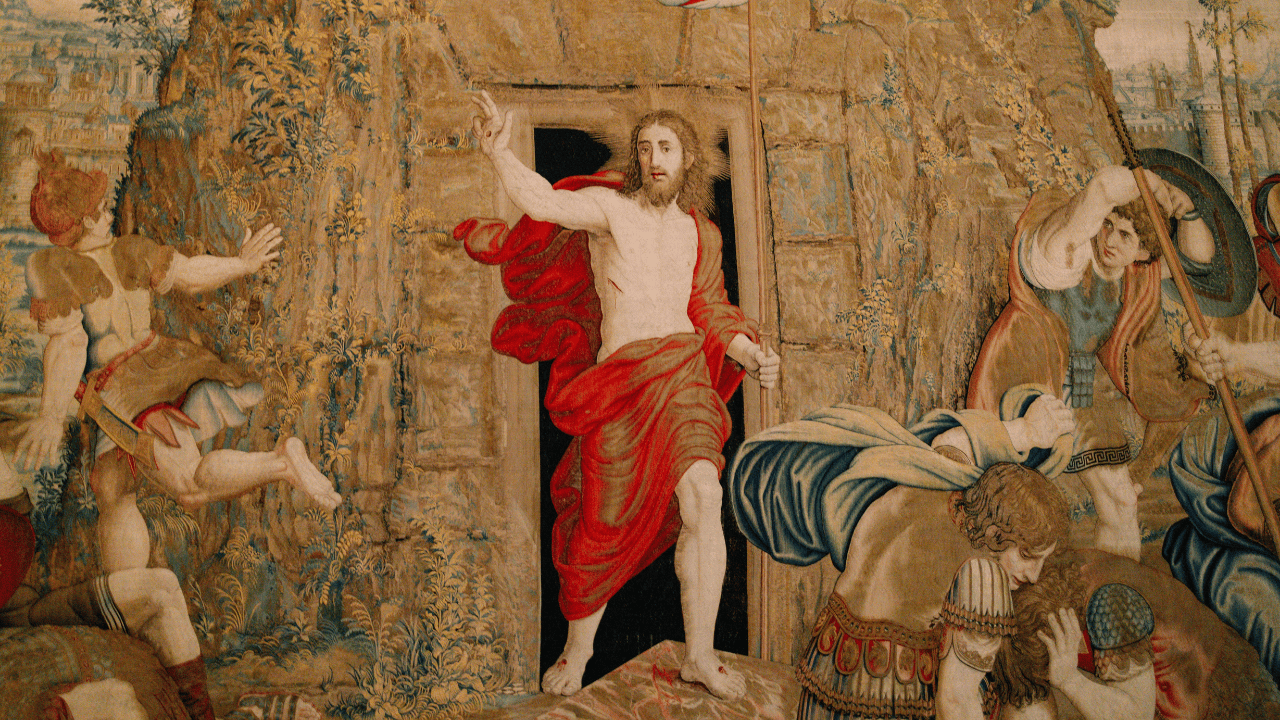
The resurrection is Christianity’s central claim. If it did not happen, as Paul recognizes, “ we are of all people most to be pitied.” Yet to Jesus biographers, Matthew, Mark, Luke and John, there was no doubting the reality of the resurrection. Each paints a different picture of its meaning. To Matthew, the resurrection is the cosmic vindication of Jesus claims of divinity and his place as messiah. Matthew takes aim at Jewish skeptics and rulers. Mark is concerned with the bewilderment and mystery of the empty tomb. Luke is concerned the Jesus connection to fulfilled Old Testament prophesy. John wants us to see the resurrected Lord’s compassion as he interacts with the nascent faith of his troubled disciples. The point of these narratives, and Paul’s commentary later, is that the resurrection is profound and its scope perhaps beyond our immediate comprehension.

